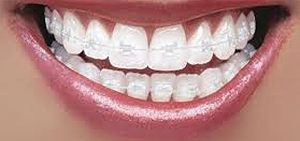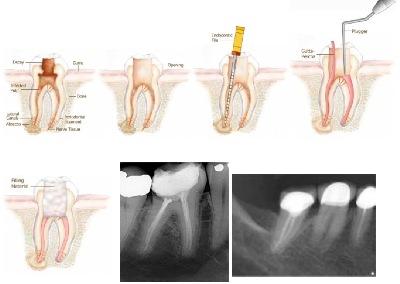Specialties
Orthodontics
There are many teenagers who can tell you just what orthodontics means. However, if you want a specific definition, the word "orthodontics" translates almost perfectly as "tooth straighten." Of course, this means that the practice of orthodontics refers to helping to straighten teeth through braces or another apparatus. Orthodontics is often used on teenagers simply because this is often the easiest time to get a straight smile, while the person is still young. However, more and more adults are choosing to straighten their teeth.
When orthodontics is used to straighten teeth in youth, the actual time needed to straighten the teeth is much shorter than it is for adults. It also helps avoid future problems like tooth decay when crooked teeth cannot be properly cleaned. This does not mean an adult cannot benefit from orthodontics. In fact, adults certainly can. The process just may take a bit longer to complete.
There are several different choices for orthodontics and each patient who comes to our office can choose an option that will work best for them. The traditional option of braces is not quite so traditional anymore. The actual metal brackets on the teeth are smaller and have a much lower profile. Ceramic brackets can also be used and appear like the white color of teeth.
Another, newer, orthodontics option is Invisalign. This option uses clear retainers called aligners. The retainers are changed on a regular basis to slowly change the position of teeth to straighten them. Many people prefer Invisalign because the aligners are barely noticeable. They can also be removed so that the patient can eat and clean their teeth as normal. Invisalign is a great option for professional adults who want to avoid the braces look.
The practice of orthodontics makes it easy for anyone to have straight teeth, which will provide a better smile and will make it easier to keep those teeth clean and healthy.



Prosthodontics
Non-Removeable / Removable Dentures
The news of our non-removable dentures has created quite a “buzz.” Only full denture wearers can appreciate how powerful an image this is. Imagine no more adhesives, loose fitting dentures or bulky material in your mouth. You brush like you have your own natural teeth. Also, it is a more reasonable option in comparison to a full mouth of dental implants. Please call for a free consultation and see it for yourself. Call now! 203.790.0111
For new denture wearers
Immediate dentures offer the best way to introduce a denture. The process is simple. The dentures are fabricated prior to extractions. The day the teeth are removed, the denture is immediately placed allowing you to:
1. Maintain Appearance and Function
2. Protect sensitive areas during the healing process
3. Begin adjusting to your dentures immediately.
The advantage of having an on-site Denture Laboratory is that it allows us to offer faster service with increased quality control.
Full Dentures / Partials
• Cast Flexi-partial - Flexible non-monomer material combined with bio-friendly metals for accurate fit and comfort as well as high aesthetics.
• Flexi-partial - fully flexible material for comfort and high aesthetics.
• Cast Partials - Bio-friendly metal combined with acrylic.
• Acrylic Partials - transitional partial made of acrylic and clasps.
Endodontics
A root canal is needed when damage has occurred to the core of a tooth and the nerve has experienced irreparable exposure or trauma.
When is a Root Canal needed?
Signs of Endodontic Disease include:
• Pain when biting down
• Prolonged sensitivity to heat or cold
• Discoloration of the tooth
• Throbbing or severe pain
• Pain attributable to changes in atmospheric pressure, such as flying in a plane
• Pain attributable to eating sweet foods and swelling or tenderness in the nearby gums
Nothing is as good as a natural tooth! And sometimes your natural tooth may need Endodontic (root canal) treatment for it to remain a healthy part of your mouth.
But understand that sometimes there are no symptoms. If you are experiencing any of these symptoms, contact our office right away as you may very well be in the stages of root canal disease or some other dental problem. Symptoms of Endodontic disease may be signs of such matters as defective fillings, periodontal disease, tooth decay and other tooth related problems.
Most patients report that having Endodontic (root canal) treatment today is as unremarkable as having a cavity filled.
Why May Endodontic Disease Cause Swelling?
When the pulpal tissue becomes severely diseased and necrotic, the resultant infection can spread from inside the tooth into the adjacent bone and soft tissues. As a result, swelling can occur in the tissues immediately surrounding the tooth.
If this situation is not treated and the endodontic disease process is not kept under control by the body's defenses, the infection can begin to spread into other tissue spaces, such as those around the eye or in the neck. In some situations, this can become a serious medical emergency.

Oral Surgery
Oral and Maxillofacial Surgery is the surgical specialty of dentistry that provides patients with surgical care of the mouth, face, jaws and associated structures. After attending four years of dental college, oral and maxillofacial surgeons become qualified as specialists through residencies in hospitals throughout the United States and are required to complete at least four years of additional training beyond dental school. Many Oral and Maxillofacial surgeons also hold medical degrees (MD) in addition to dental degrees (DDS) and receive training in general surgery as well. After training is completed, Oral and Maxillofacial surgeons can become
Surgical services offered by Oral and Maxillofacial surgeons include removal of teeth (especially wisdom teeth), preparation of the mouth for dentures and implant placement. Oral Surgeons also perform reconstructive surgery of oral and facial deformities, and facial injuries/fractures. In addition, Oral Surgeons also perform biopsies, removal of tumors or cysts of the jaws, face and mouth as well as perform cosmetic surgery of the oral and facial regions. These services are available both electively and on an emergency basis.
Because of their specialized training, Oral and Maxillofacial Surgeons are able to offer qualified patients the option of varying levels of anesthesia and sedation during surgery. These options vary from local anesthesia to intravenous sedation. It is important to speak with the Oral and Maxillofacial Surgeon before a procedure to find out what is appropriate for you. Most surgeries can be performed in the office setting, but certain patients may be best served in the hospital either as same-day surgery patients or as in-patients.
Nitrous oxide / oxygen is available and is a lighter form of sedation than IV sedation. Recovery from nitrous oxide sedation is rapid, and is safe for most but not all patients.



